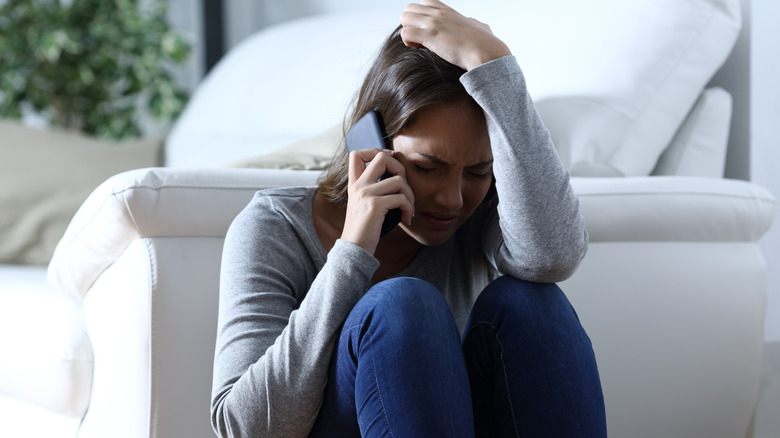Everything You Need To Know About Crisis Hotlines From A Mental Health Professional
It's likely that you have heard about the 988 crisis lifeline that was launched in July 2022. 988 is a convenient number to call when someone's experiencing psychological distress or having thoughts about ending their life. Despite crisis hotlines being implemented, some people are hesitant to call due to uncertainty about what to expect.
To gain an understanding of what crisis hotlines are about, Health Digest spoke with Dr. Sanam Hafeez, director of Comprehend the Mind and NYC neuropsychologist. "In 2020, suicide was the 12th leading cause of death in the United States, claiming the lives of over 45,900 people," Dr. Hafeez pointed out. "[Hotlines] can be a lifesaver in dire situations."
You may wonder what would prompt someone to consider calling a crisis hotline. "Typically, people use mental health hotlines when they are in dire need of help and it cannot wait until they are able to see their existing therapist," Dr. Hafeez shared. "The call may be spurred by suicidal thoughts, extreme depression, grief, severe anxiety, or addiction that has reached its peak."
A crisis hotline is available 24 hours a day, 7 days a week, and is free and confidential, says Dr. Hafeez. "The only time a third party would be involved is if the caller is making an immediate threat to harm themselves or others," he noted.
Showing our vulnerability to others is easier when we know what to expect, and Dr. Hafeez is here to explain what to anticipate when calling a crisis hotline.
What can someone expect when they call a crisis hotline?
When making a difficult phone call, even just pressing the button to dial can be intimidating. To paint a clearer picture, Dr. Hafeez offers a snapshot of what a call to a crisis hotline may look like. "When you place the call, you receive an automated message," he shared. "They try to keep hold times brief, and callers are routed to the crisis center closest to them so that staff is aware of resources within the caller's community."
The first thing you might want to know is who you'll be speaking with once connected. "A trainer crisis worker will take the call," Dr. Hafeez clarified. "Whether on staff of that center, a volunteer or a professional, they have all undergone training in handling crisis calls."
Some people aren't comfortable talking with strangers during a mental health crisis, but calling a crisis hotline doesn't mean you'll have to share your life story. "Callers are free to share whatever information they wish about the reason for the outreach," Dr. Hafeez points out. "A crisis worker will always do their best to de-escalate the situation and devise a safety plan that will keep the person safe from self-harm so that the police do not need to be called to intervene."
Ultimately, Dr. Hafeez explains that keeping the caller out of imminent physical danger is the primary goal of the crisis worker. To protect the caller, the police may be notified in severe situations.
How can a crisis hotline help someone?
One of the most critical functions of a crisis hotline is to keep distressed individuals safe from harm until more intensive care is available. "Very often, the times people experience the worst mental crisis are when they are alone and access to friends, family, or traditional therapeutic help is not available," Dr. Hafeez told us. "Although a mental health crisis can hit anytime, [it's the ones] where little to no help is accessible that can mean the difference between life and death." These 24/7 crisis hotlines are important because they offer people from all walks of life a safe place to talk about their struggles.
Calling a crisis lifeline can even be beneficial if you're in emotional distress but aren't contemplating suicide. "If the issues are not as severe, the person will typically be matched with a therapist who will first assess what prompted the call and the patient's needs," explained Dr. Hafeez.
However, making a phone call to a crisis hotline should not act as a substitute for making an appointment with a therapist. "It is important to understand that hotlines are not intended to provide long-term therapy," according to Dr. Hafeez. "They are designed to get people through a crisis and engage them in a formal therapeutic plan to uncover root issues, behavior patterns, family dynamics, medication if needed, etc."
If you would like to learn more about Dr. Sanam Hafeez, you can visit Comprehensive Consultation Psychological Services, P.C.



